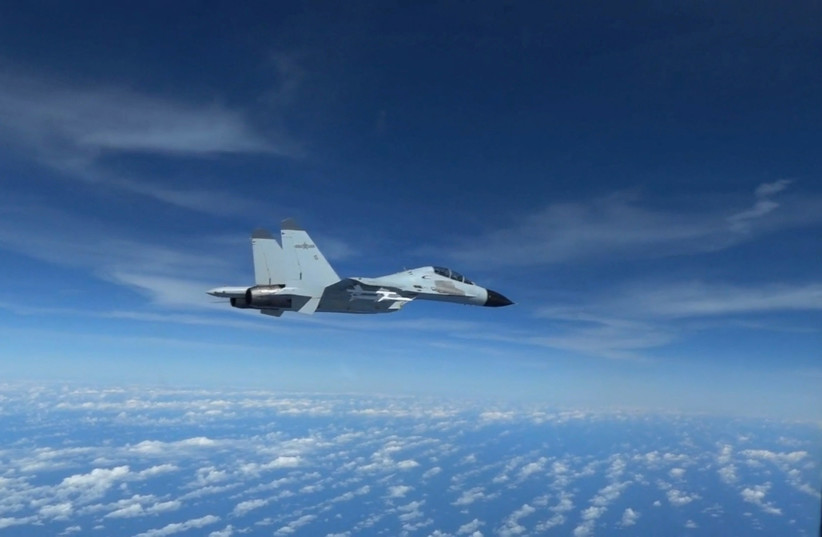A furious China launched "punishment" drills around Taiwan on Thursday in what it said was a response to "separatist acts," sending up heavily armed warplanes and staging mock attacks as state media denounced newly inaugurated President Lai Ching-te.
The exercises, in the Taiwan Strait and around groups of Taiwan-controlled islands that sit next to the Chinese coast, come just three days after Lai took office, a man Beijing detests as a "separatist."
China, which views democratically governed Taiwan as its own territory, has denounced Lai's inauguration speech on Monday, in which he called on China to stop its threats and said the two sides of the strait were "not subordinate to each other." On Tuesday, Chinese Foreign Minister Wang Yi called Lai "disgraceful."
Lai has repeatedly offered talks with China but has been rebuffed. He says only Taiwan's people can decide their future and rejects Beijing's sovereignty claims.
The Eastern Theatre Command of the Chinese People's Liberation Army (PLA) said it had started joint military drills involving the army, navy, air force, and rocket force in areas around Taiwan at 7:45 a.m. (2345 GMT).

The drills are being conducted in the Taiwan Strait, the north, south and east of Taiwan, as well as areas around the Taiwan-controlled islands of Kinmen, Matsu, Wuqiu and Dongyin, the command said in a statement.
Chinese state media said China sent out dozens of fighter jets carrying live missiles and conducted mock strikes, along with warships, of high-value military targets.
Taiwan's defense ministry condemned the drills, saying that it had dispatched forces to areas around the island, that its air defenses and land-based missile forces were tracking targets, and that it was confident it could protect its territory.
"The launch of military exercises on this occasion not only does not contribute to the peace and stability of the Taiwan Strait, it also highlights (China's) militaristic mentality," the ministry said.
Taiwan's presidential office expressed regret that China was threatening the island's democratic freedoms and regional peace and stability with its "unilateral military provocations" but said people could rest assured Taiwan could ensure its security.
China's state broadcaster CCTV said Lai's inauguration speech was "extremely harmful" and China's countermeasures are "legitimate, legal and necessary."
Lai's speech was a confession of a desire for Taiwan independence and undermined peace and stability across the strait, it said.
Taiwan's future can only be decided by China's 1.4 billion people, not just Taiwan's 23 million people, it added.
No surprise
A senior Taiwan official, speaking anonymously given the sensitivity of the matter, told Reuters that the drills are part of a scenario Taiwan had anticipated and that the island's government had a "comprehensive grasp" of Chinese military movements.
Taiwanese officials had said in the run-up to the inauguration they were keeping watch for Chinese military movements. China last staged large-scale war games near Taiwan in 2023 and 2022.
The drills focus on joint sea-air combat-readiness patrols, precision strikes on key targets, and integrated operations inside and outside the island chain to test the "joint real combat capabilities" of the forces, China's military said.
"This is also a strong punishment for the separatist acts of Taiwan independence forces and a stern warning against the interference and provocation by external forces," the command added.
Chinese state media published a map of the drills zones, in five areas all around Taiwan and the islands Taiwan controls near the Chinese coast.
Taiwanese officials told Reuters those areas were outside Taiwan's contiguous zone, which is 24 nautical miles from the main island's coast.
One of the officials said China has not announced any no-fly zones, nor has Taiwan observed any large-scale movements of China's ground and rocket forces.
Su Tzu-yun, a research fellow at Taiwan's top military think tank, the Institute for National Defence and Security Research, said that although the drills would only last two days, the scope is large relative to previous exercises, as they included Taiwan's outlying islands.
This is designed to demonstrate China's ability to control the seas and prevent the involvement of foreign forces, he added.
"The political signals here are greater than the military ones," he added.
There was no sign of alarm in Taiwan, where people are long used to Chinese military activity. The benchmark stock index TWII, currently at a historic high, was up 0.2% on Thursday morning.
"The drills will have a short-term psychological impact but won't reverse the long-term upward trend of Taiwan stocks," said Mega International Investment Services vice president Alex Huang.
A central bank official told Reuters the foreign exchange market was operating as normal, with no abnormal entry or exit of foreign capital.
In August 2022, China launched live-fire military exercises around Taiwan immediately after a visit, much condemned by Beijing, by former US House speaker Nancy Pelosi. That series of exercises, the scale of which was unprecedented, lasted for four days, followed by several days of additional drills.
